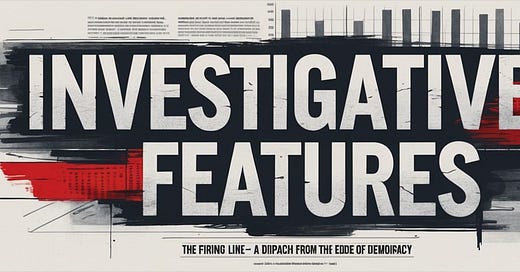How Trump’s U.S. Patent and Trademark Office Takeover Enriched Allies and Jeopardized Public Health
A Deep Dive into the Pay-to-Play Scheme That Turned the U.S. Patent System into a Corporate Profit Engine—And Left Millions Behind
The U.S. Patent and Trademark Office (USPTO) Takeover: Installing Loyalists, Rewriting Rules
In 2025, President Donald Trump solidified control over the U.S. Patent and Trademark Office (USPTO) by appointing John Squires, a Goldman Sachs-aligned intellectual property attorney, as Director, and Howard Lutnick, a billionaire inventor and Trump donor, as Commerce Secretary. Their mandates were clear: prioritize corporate patent holders over public interest.
Squires’ Agenda: A longtime critic of patent reform, Squires vowed to “turn the system inside out” by rolling back Biden-era policies like “march-in rights” (which allowed price considerations to override drug patents) and supporting the Patent Eligibility Restoration Act to expand patentable subjects, including AI algorithms and biologic methods.
Lutnick’s Vision: As a patent holder with 50+ inventions, Lutnick pushed to fast-track approvals for domestic manufacturers while increasing scrutiny of foreign competitors—a move critics labeled “economic nationalism disguised as innovation policy”.
Result: The U.S. Patent and Trademark Office (USPTO) became a bottleneck for generic drug challenges while accelerating monopolies for biologics and AI-driven pharmaceuticals.
Financial Ties: Pharma Cash, Family Trusts, and Inauguration Dollars
The Trump administration’s patent policies aligned seamlessly with the financial interests of its inner circle and pharmaceutical donors:
Trump Family Investments in Big Pharma
Sanofi Stake: In 2020, Trump’s family trusts held investments in the Dodge & Cox International Stock Fund, whose largest holding was Sanofi, maker of hydroxychloroquine. As Trump promoted the unproven COVID-19 treatment, Sanofi’s stock rose 16%.
Post-Election Windfall: Pharma giants like Pfizer and lobbying group PhRMA donated over $1 million each to Trump’s $150 million+ inauguration fund in 2025, securing access to policy discussions on patent reforms.
Corporate Lobbying and Revolving Doors
PhRMA’s $381 Million Lobbying Blitz: In 2023, the pharmaceutical industry spent record sums to kill the Affordable Prescriptions for Patients Act, which aimed to curb patent thickets. Following the inauguration, Trump’s USPTO adopted PhRMA’s wish list, including weaker antitrust enforcement against evergreening.
Revolving Door Appointments: Former Sanofi executives joined the FDA. At the same time, Michelle K. Lee (Obama-era USPTO Director) expanded fees for Patent Trial and Appeal Board (PTAB) proceedings—tools used disproportionately to invalidate small inventors’ patents.
The Pharma Playbook: Monopolies, Profits, and Patient Suffering
Trump’s USPTO enabled pharmaceutical and medical device companies to exploit patents with unprecedented aggression:
Patent Thickets and Evergreening
Humira: AbbVie’s 247 patents extended its monopoly to 39 years, pricing the drug at $84,000/year in the U.S. vs. $2,500 in Europe. Post-2025 reforms, biosimilar launches delayed until 2031.
Keytruda: Merck filed 129 patents to block competition until 2036, ensuring annual revenue of $30 billion for its cancer drug.
Crisis Profiteering
COVID-19: Despite taxpayer funding, Moderna and Pfizer retained exclusive patents on mRNA vaccines, opposing the WHO’s TRIPS waiver. Pfizer earned $69 billion in 2022 alone, while low-income nations faced shortages.
Insulin: Novo Nordisk repurposed diabetes patents for weight-loss drugs, pricing Ozempic at $1,000/month—a 400% markup since 2020.
Medical Device Monopolies
Ocular Implants: Alcon’s 50+ patents on intraocular lenses (IOLs) inflated costs to $4,000/eye, excluded from most insurance plans.
Prosthetics: DEKA’s NIH-funded LUKE Arm costs $100,000 due to 120+ patents, while 3D-printed alternatives face lawsuits from Össur.
The Human Toll: Who Pays the Price?
Trump’s patent policies exacerbated systemic inequities, leaving vulnerable populations to bear the burden:
Health Disparities
Racial Gaps: Black Americans are 3x more likely to die from glaucoma due to delayed access to advanced Intraocular Lenses (IOLs). Latino communities face 50% higher amputation rates from diabetes, worsened by unaffordable prosthetics.
Rationing Care: 23 million Americans skipped medications in 2025 due to costs, while 40% of low-income glaucoma patients delayed surgery, risking irreversible blindness.
Economic Fallout
Household Debt: Medical debt now accounts for 58% of U.S. bankruptcies, with the average diabetic spending $1,000/month on insulin and devices.
Taxpayer Burden: Patent-protected drug monopolies cost Medicare $167 billion annually for just three drugs: Humira, Keytruda, and Revlimid.
The Road Ahead: Reclaiming Innovation for the Public Good
To dismantle this pay-to-play system, policymakers and advocates must:
Overhaul Patent Laws
Ban Evergreening: Limit secondary patents to 5 years post-approval and eliminate “method of use” claims. Eliminating or time-limiting “method of use” claims would be a significant reform, aimed at preventing pharmaceutical companies from extending monopolies on technicalities.
Restore March-In Rights: Allow generics during public health crises, as seen with HIV drugs in South Africa.
Regulate Prices
OECD Reference Pricing: Align U.S. drug costs with international averages, saving $72 billion/year.
Non-Profit Production: Expand California’s CalRx model, which sells insulin at $30/vial vs. Sanofi’s $99/vial.
Empower Patients
Grassroots Advocacy: Support groups like Patients for Affordable Drugs, which pressured Eli Lilly to cap insulin at $35/month.
Transparency Laws: Mandate public disclosure of patent settlements and Pharma lobbying expenditures.
Conclusion: A System Hijacked, A Future at Stake
The Trump administration’s USPTO takeover epitomizes how regulatory capture and corporate greed converge to exploit public health. By 2035, unchecked patent abuse could:
Leave 25 million Americans rationing medications annually.
Inflate healthcare spending by $610 billion due to monopolies.
Widen the life expectancy gap between rich and poor by 3 years.
As Dr. Reshma Ramachandran of Yale warns: “When patents become barriers, we must choose humanity over monopolies.” The stakes are not just economic—they’re a matter of survival.
Sources
Keywords: Trump USPTO takeover, Pharma patents, Patent thickets, Drug pricing, Healthcare corruption, corporate lobbying, medical debt
1. https://ipwatchdog.com/2025/03/11/john-squires-becomes-official-nominee-head-uspto/id=187061/
2. https://usinventor.org/statement-john-squires/
9. https://cepr.net/publications/trumps-handout-to-the-pharmaceutical-industry/






Thank you for keeping us informed!
Our country is trump and his cronies piggy bank.